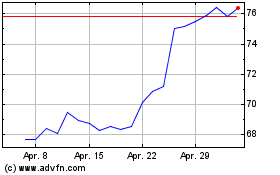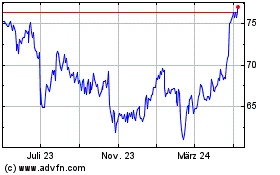By Jenny Strasburg and Cecilia Butini
LONDON -- AstraZeneca PLC said sales of its Covid-19 vaccine --
which it has promised to sell initially without profit -- haven't
kept up with its costs, resulting in a hit to earnings and a
warning the vaccine effort could continue to affect margins.
The drug giant booked $275 million in revenue in the first three
months of the year from sales of its Covid-19 vaccine, developed in
partnership with the University of Oxford. The company delivered 68
million doses globally during the first quarter, far short of
targets.
In Europe, AstraZeneca shortfalls totaling tens of millions of
doses have inflamed political tensions. This week, the European
Union sued the company, alleging failure to satisfy its vaccine
contract with the bloc. AstraZeneca has said it is working to catch
up with supply pledges.
Most of AstraZeneca's vaccine sales revenue in the quarter, $224
million, came from Europe, with $43 million in sales to
emerging-market countries. The numbers pale in comparison with
multibillion-dollar sales forecasts of other vaccine makers
including Pfizer Inc. and Moderna Inc.
For AstraZeneca, initially at least, the vaccine effort was a
drain on earnings during an otherwise strong quarter. Shares were
up 3% in early trading on better-than-expected sales and profits.
Costs from the vaccine effort shaved 3 cents off its per-share
earnings for the quarter, which came in at $1.18, versus 59 cents
in the comparable quarter of 2020.
The company and its manufacturing partners have supplied 300
million vaccine doses around the world so far, a year after
AstraZeneca agreed to join Oxford's effort to roll out a pandemic
shot globally.
The company said it was costly to provide "equitable supply" of
the vaccine at no profit, with a substantial impact on overall
profit margins. Core gross profit margins declined 3 percentage
points in the quarter, to 74.6%.
"These variations in gross margin performance between quarters
can be expected to continue," AstraZeneca said. On a call with
reporters, executives said the fluctuations will stabilize as
deliveries continue, and the company expects to break even over
time.
Chief Executive Pascal Soriot said that AstraZeneca, despite
facing disappointments and criticism, doesn't regret its Covid-19
vaccine effort or no-profit approach with Oxford. He pointed to
India, which is grappling with soaring infections and deaths, where
the AstraZeneca vaccine is the dominant shot available.
Dr. Soriot said that more than a hundred Covid-19 vaccines were
in development last year, and only a handful have made it to
market. "Where are all those vaccines? They're nowhere." He said
that even with AstraZeneca's big supply shortfalls to Europe, it
will have delivered 50 million doses to the bloc between February
and the end of April.
The British-Swedish drugmaker also said Friday it plans to apply
to the U.S. Food and Drug Administration for authorization for the
vaccine in coming weeks.
AstraZeneca's U.S. rollout plans have faced prolonged delays,
after early estimates that the shot might be available in late
2020. The drugmaker said in March this year it would apply for FDA
review by mid-April. The Wall Street Journal reported Thursday that
AstraZeneca had told U.S. officials in recent days it might need
until mid-May to finish its application.
The company has struggled to pull together the full data
required for the report, which includes efficacy and safety
statistics from almost four months of vaccinations in the U.K.,
plus data from large-scale U.S. and U.K. human trials, The Journal
reported.
Overall first-quarter profit beat analyst expectations at $1.56
billion, roughly double a year ago, on increased revenue of $7.3
billion. A key benchmark, product sales, increased 15% on strong
performance of core cancer drugs and new products in the company's
pipeline.
Last year, the company doubled its full-year profit and struck a
$39 billion deal to buy Boston-based Alexion Pharmaceuticals Inc.,
a maker of rare-disease drugs and therapies. But public attention
has been heavily focused on the Covid-19 vaccine AstraZeneca
brought to market in January, when the first mass vaccinations
using the shot took place in the U.K. It is now in use in more than
100 countries.
The vaccine effort has faced a series of hurdles, from confusing
clinical-trial results and production delays to questions about the
shot's precise efficacy and rare blood-clotting problems among a
small percentage of people post-vaccination.
Still, it is a major focus of global hopes for curbing the
pandemic, especially among developing countries with less access to
more expensive vaccines bought up by wealthier countries.
AstraZeneca said the company, together with the Serum Institute of
India, has delivered more than 48 million doses to a global funding
initiative known as Covax focused on supplying shots to
less-wealthy countries.
AstraZeneca reiterated its full-year outlook for total revenue
increasing by a low-teens percentage, and core earnings per share
rising to between $4.75 and $5.00 from $4.00, all at constant
exchange rates. The guidance doesn't incorporate revenue or profit
impact from Covid-19 vaccine sales or the proposed Alexion
acquisition.
Write to Jenny Strasburg at jenny.strasburg@wsj.com
(END) Dow Jones Newswires
April 30, 2021 07:54 ET (11:54 GMT)
Copyright (c) 2021 Dow Jones & Company, Inc.
AstraZeneca (NASDAQ:AZN)
Historical Stock Chart
Von Jun 2024 bis Jul 2024

AstraZeneca (NASDAQ:AZN)
Historical Stock Chart
Von Jul 2023 bis Jul 2024
